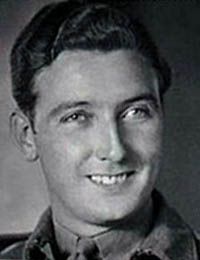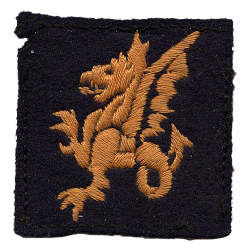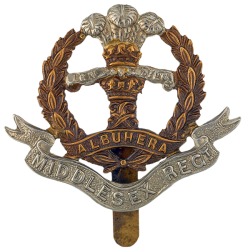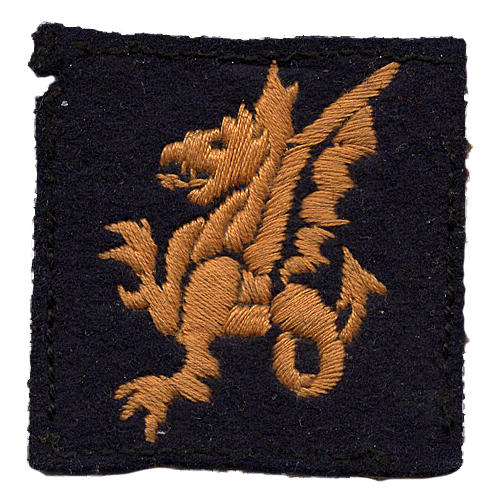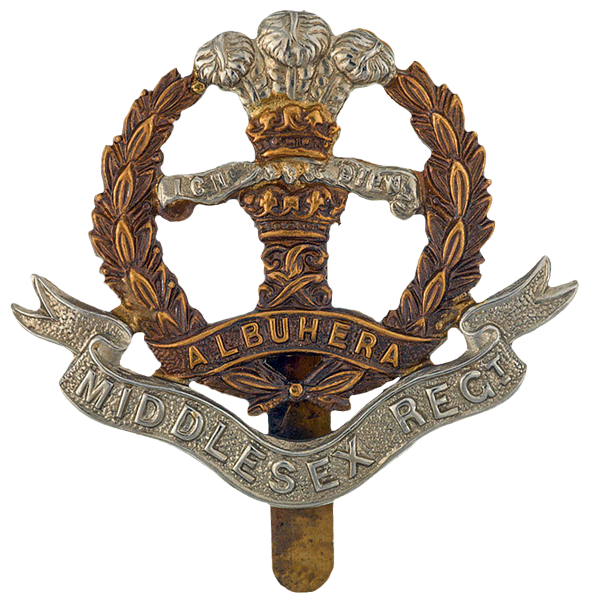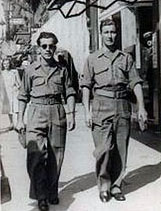My Dad was called up in 1940 and was enlisted first with the Kings Royal Rifles and did his training at Winchester. The Kings Royal Rifle Corps lost over 80% of their men, killed or captured at Dunkirk. In their re-organisation, he was sent to the Middlesex Regiment. As he could already drive he was to be trained to drive a Bren Gun Carrier.
The Middlesex Regiment never fought on their own, they were always attached to other regiments as support troops , they had machine guns, bren guns and mortars.
On the invasion of France in 1944, some of his regiment were involved on the first day landings but I think he landed the evening of the 7th June. They were told to get through Hermanville, a seaside town, as quickly as possible. In his hurry he drove into the back of a very large Churchill tank and chipped a tooth, he led a charmed life as that was the only injury he had during the whole war.
The first battle came a day later at Cambes Wood with fighting alongside the Kings Own Scottish Borderers and the Royal Ulster Rifles against the 21st Panzer Division. My father had been a personal driver to an officer called Captain Passey and had known him for over a year. Some officers were gathered together in an apple orchard, mortar fire came over and killed them all including Captain Passey, this devastated the men who had known him. Another officer called McDowell , who had recently heard the news that his son had been born , was sent up as a replacement and got killed almost immediately.
The fighting here was certainly a baptism of fire for men who had trained for this for many months. My father had befriended a young man called Jordan Jordanou a Greek Cypriot living in London. Jordon jokingly known as the only Greek cockney in the British army, was a dispatch rider and every time he had to go and take messages down small country lanes to another group, he would shake Dad's hand and say I know I am going to get killed this time”. He didn’t, he survived the war and lived long enough to have grandchildren.
Battles for towns in Normandy were intense against a fanatical opposition. One time Dad and others were told to go down a lane , a sniper was picking off the drivers and Dad left the road and drove on the grass. The men he was carrying screamed the warning there were mines there. Dad carried on unhurt and the driver of the following carrier was killed.
From Normandy and the battles for Caen, the terrible Operation Goodwood until they came to rest for a while at Le Thil en Vexin where there was even enough time to have a football match. They took to the road again passing the old battlefields of the First World war of the Somme and Mons, into Belgium and then on to Holland for the Operation Market Garden. While the paratroopers were fighting to hold the bridge, dad and others were fighting to get across rivers in the area of Weert, where the bridges had been blown up.
Dad said the weather was beginning to get extremely wet and cold and there are photographs of him looking fat because he had three layers of jackets on. They got to a place called Helmond when people ran out into the streets to greet them. Because they were unable to get to Arnhem they were pulled back and then spent some time fighting in Overloon and Venray. The American 7th Armoured had just pulled out with about 500 casualties.
A long cold winter was spent at Overloon. It was from this time that my Dad experienced stomach pains from the cold. At one time he was ‘dug in’ by a church and the men were throwing out bones much to my dad’s horror. The intense cold made many men ill, some had pneumonia. Dad never got over his stomach problems and I did research later and found many Germans in Russia were affected by the intense cold in this way.
Eventually through Holland into Germany where the Middlesex were later involved in fighting all the way up to Bremen.
He was certainly a changed man when the war was over and he came home. For many men they loved the excitement of the war, dad was unusual for a Londoner, quiet, softly spoken and sentimental. He seemed to have lost his confidence. He hated noise, I later understood, why- being next to so many guns . He had great sympathy for the Dutch people and was delighted many years later when I came back from Australia with a Dutch husband. They were friends for many years until he died at the age of 69.
Written by Margie Hofman, Bill Hickman's daughter
